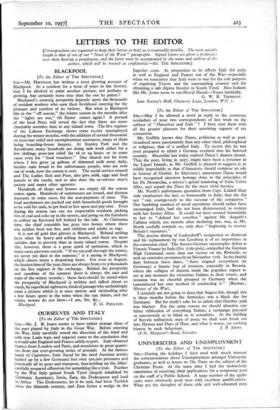LETTERS TO THE EDITOR
[Correspondents are requested to keep their letters as brief as is reasonably possible. The most suitabb length is that of one of our "News of the Week" paragraphs. Signed letters are given a preferencl over those bearing a pseudonym, and the latter must be accompanied by the name and address of the author, which will be treated as confidential.—Ed. THE SPECTATOR.]
BLACKPOOL [To the Editor of THE SPECTATOR.]
SIR,—Mr. Harrisson has written a most glowing account of Blackpool. As a resident for a term of years in the district, may I be alloived to paint another picture, not perhaps as glowing, but certainly more true than the one he paints ?
Blackpool's seeming prosperity depends upon the thousands of resident workers who earn their livelihood catering for the pleasure and comfort of its visitors. But what is Blackpool like in the "off season," the winter season in the months after the "Lights are out," till Easter comes again ? A perusal of the local Press will reveal the fact that there are more charitable societies than in any inland town. The live register of the Labour Exchange shows some io,000 unemployed during the winter months, with the addition of several thousands on poor-law relief and unemployment assistance, many of them being boarding-house keepers. At Stanley Park and the Aerodrome many hundreds are doing task work either for a few shillings poor-law relief for 16 or 24 hours or in some cases even for "food vouchers." One church not far from where I live gives 54 gallons of skimmed milk away daily, besides stale bread to the unfortunate people, who are now out of work, now the season is over. The social service council and The Ladies Sick and Poor, also give milk, eggs and food parcels to the needy, and so also does the ex-service men's society and many other agencies.
Hundreds of shops and houses are empty till the season comes again. Hundreds of summonses are issued, and distress warrants in some cases, for the non-payment of rates. The local auctioneers are packed out with household goods brought to be sold for cash, to get food to live upon and pay rent. Even during the season one can see respectable residents picking bits of coal and coke up in the streets, and going on the foreshore to collect up firewood left behind by the tide. At Christmas time, the chief constable has gone into homes where there was neither food nor fire, and children and adults in rags.
It is not all gold that glitters at Blackpool. Behind smiling faces often lie heavy and aching hearts, and there are more suicides due to poverty than in many inland towns. Despite this, however, there is a great spirit of optimism, which in many cases prevents suicide. "If we can pull through the winter, we never yet died in the summer," is a saying in Blackpool, which cheers many a despairing heart. For even in August, the busiest time of the year, there are always from 2 to 3 thousands on the live register at the exchange. Behind the prosperity and sunshine of the summer there is always the care and want of the winter months ; these facts should be stated when the prosperity of Blackpool is written and talked about so much, by superficial sightseers, birds of passage who unthinkingly paint a picture which is at once untrue and misleading after a few hours spent in the town when the sun shines, and the wintry storms do not blow.—I am, Sir, &c.,










































 Previous page
Previous page